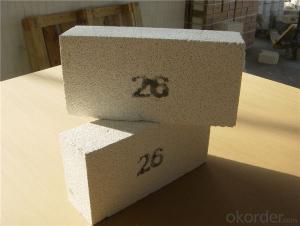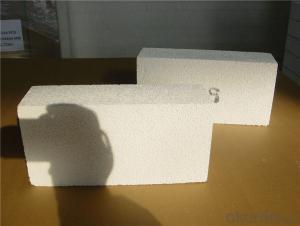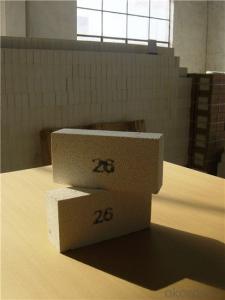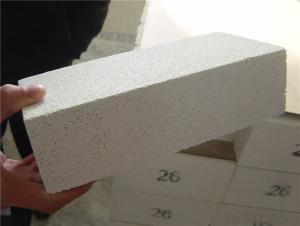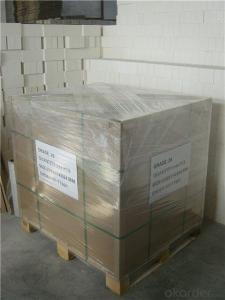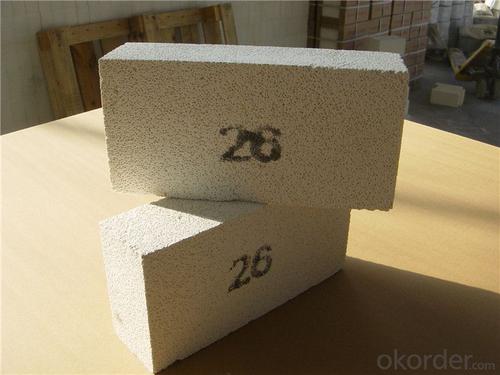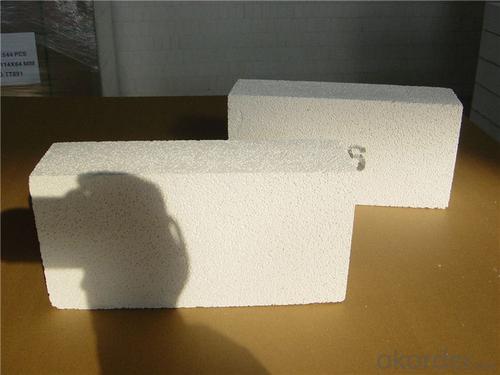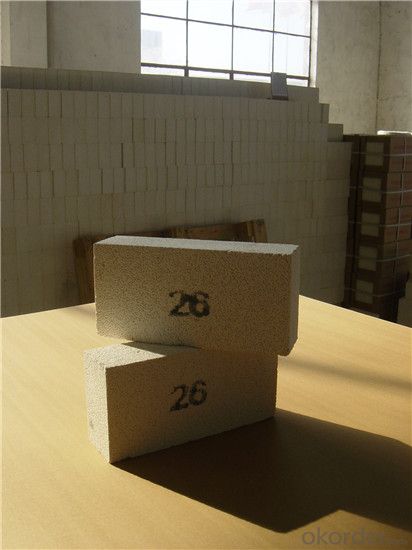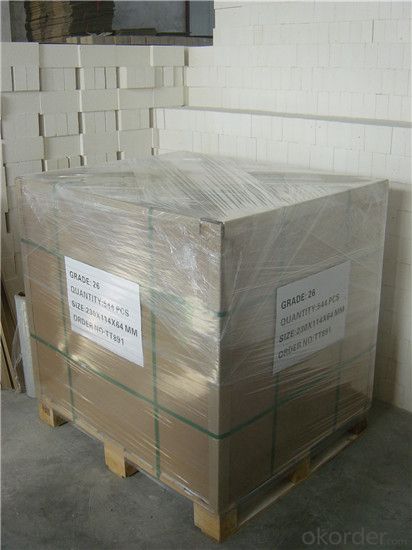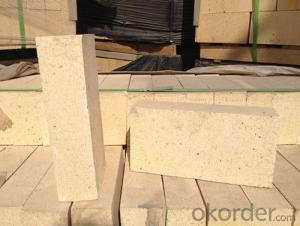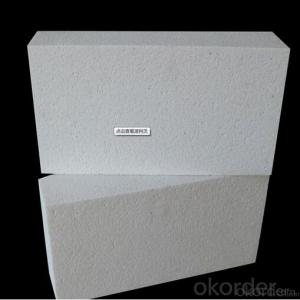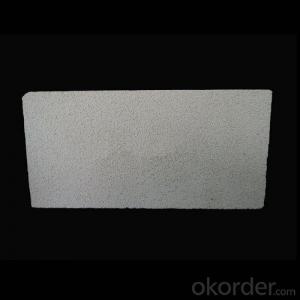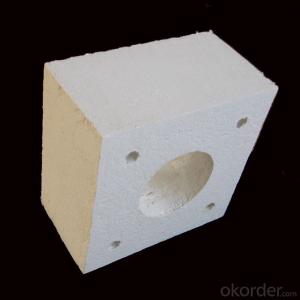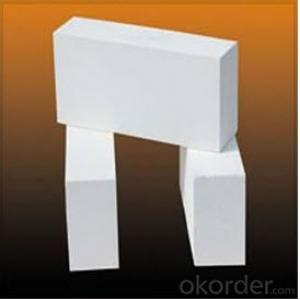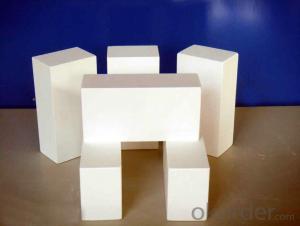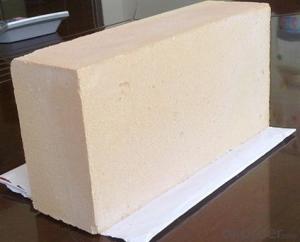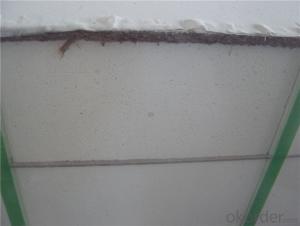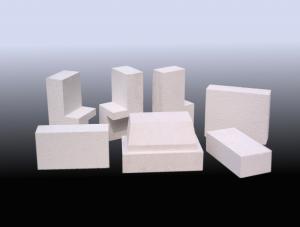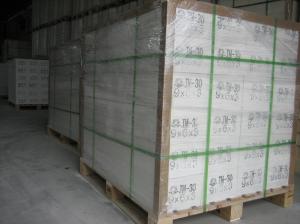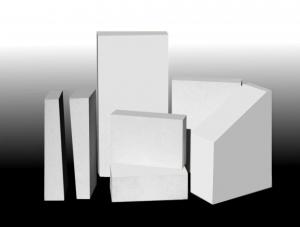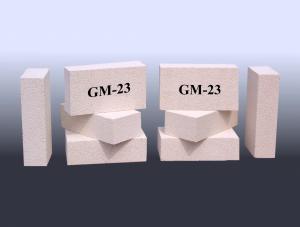Insulating Fire Brick for Coke Ovens - Thermal Insulation Fire Clay Brick
- Loading Port:
- Shanghai
- Payment Terms:
- TT OR LC
- Min Order Qty:
- 1 m.t.
- Supply Capability:
- 1000 m.t./month
OKorder Service Pledge
OKorder Financial Service
You Might Also Like
Thermal Insulation Fire Clay Brick
Refractory brick is a block of refractory ceramic material used in lining furnaces, kilns, fireboxes, and fireplaces.
We provide high quality Refractory Fire Bricks that are used on wide range in the various industries like Cement, Glass and Steel. Refractory Fire Bricks are provided as per the quantity and specifications required by the customers. We provide an extensive range of Refractory Fire Bricks at reasonable prices that depend upon the quantity ordered.
Application
Insulating Fire Brick are used for the lining of converter, alternating current arc furnace, direct Current arc furnace and the ladle slag line, etc.
Company Advantage
(1)Long Insulating Fire Brick manufacture history: 25 years manufacturer
(2)Advanced equipment
(3)Diversification of production standards: ISO ANSI FEPA JIS ASTM
(4)Flexible payment: T/T L/C D/P D/A
(5)Professional marketing team and after-sale service
Insulating Fire Brick main feature:
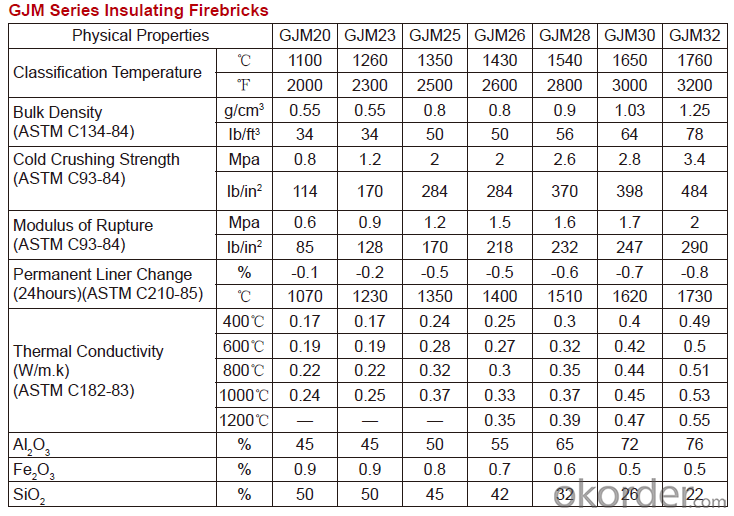
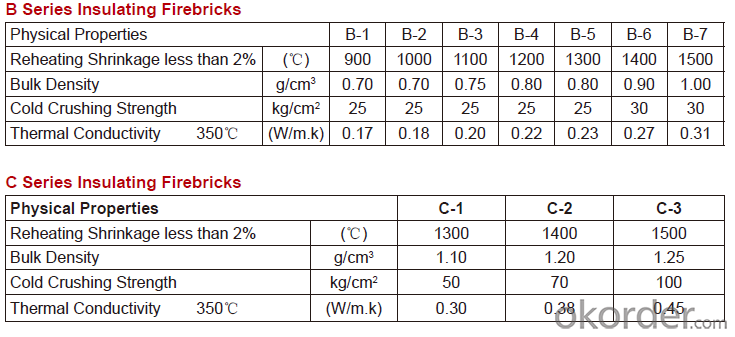
Equipment
1 unit of Ceramic Abrasive (SG Abrasive) pilot production line
2 units of Compact grain Abrasive pilot production lines
1 unit of high-end coated abrasives (abrasive cloth) production line
2 units of Boron Carbide production lines
3 large flexible crushing and sieving lines for grit production lines
6 units of 5000KVA-10000KVA dumping type electric arc furnaces for Brown Fused Alumina fusion
Q1 What’s the transport method?
A1 FCL delivery goods with wooden pallet or wooden case by sea; If LCL delivery, must with wooden case; Sometimes need open top, flat rack or bulk cargo.
Q2 What’s the required payment term?
A2 Generally 30% TT as the prepayment, 70% TT before delivery. If need, 100% Irrevocable Letter of Credit or negotiation.
Q3 Which country are our products exported to?
A3 Apart from entire Chinese market, the US, Russia, Japan, Korea, Australia and some Southeast Asian Nations.
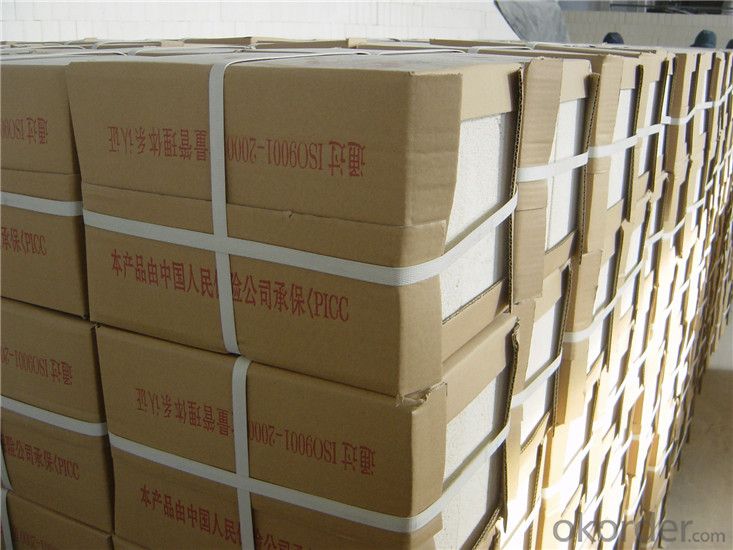
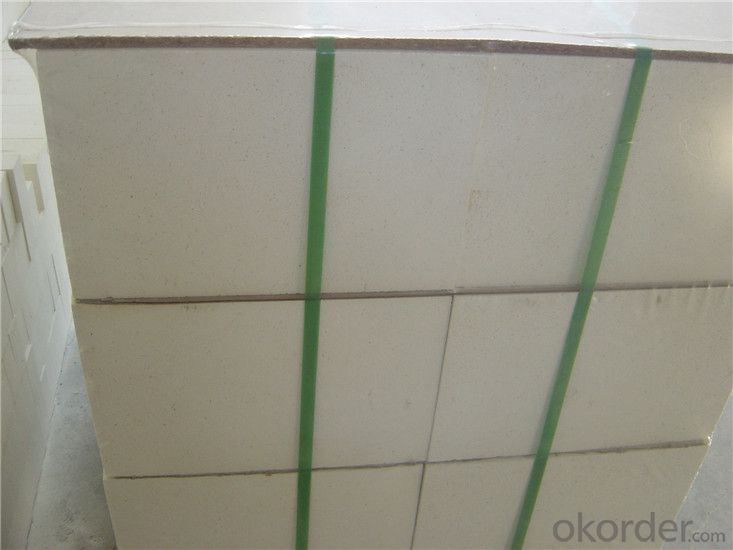
- Q: What materials are used to make insulating fire bricks?
- Insulating fire bricks are made from a variety of materials that possess high thermal insulation properties. The most common material used in the production of these bricks is a type of clay known as kaolin clay. This clay is mixed with other additives such as alumina, silica, and zirconium to enhance its insulating properties and increase its resistance to high temperatures. In addition to clay, other materials like sawdust, vermiculite, perlite, and calcium silicate are also sometimes added to the mixture to further improve the insulation capabilities of the bricks. Overall, the combination of these materials allows insulating fire bricks to have low thermal conductivity, high heat resistance, and excellent insulation qualities, making them suitable for a wide range of industrial and domestic applications.
- Q: Can insulating fire bricks be used in rocket stoves?
- Yes, insulating fire bricks can be used in rocket stoves. In fact, they are often preferred for their high insulation properties. Insulating fire bricks are made from lightweight refractory materials, such as silica, which have low thermal conductivity. This means that they are able to withstand high temperatures while minimizing heat loss, making them an ideal choice for rocket stoves. Rocket stoves are designed to efficiently burn biomass fuel, such as wood or charcoal, by creating a combustion chamber with a vertical chimney. The insulating fire bricks can be used to construct the combustion chamber and line the chimney, ensuring that the heat generated by the fire is effectively contained and directed towards the cooking surface. By using insulating fire bricks, rocket stoves can achieve higher temperatures and maintain them for longer periods of time. This results in more efficient and effective cooking, as well as reduced fuel consumption. Additionally, the insulating properties of these bricks also help to protect the surrounding environment from excessive heat, reducing the risk of accidental burns or fires. Overall, insulating fire bricks are a suitable choice for rocket stoves due to their ability to withstand high temperatures, minimize heat loss, and improve the efficiency of the cooking process.
- Q: Can insulating fire bricks be used in the construction of glass melting furnaces?
- Yes, insulating fire bricks can be used in the construction of glass melting furnaces. These bricks are designed to withstand high temperatures and provide excellent insulation, making them suitable for use in the extreme heat of glass melting processes. Their low thermal conductivity helps to retain heat within the furnace, improving energy efficiency and maintaining a stable melting environment.
- Q: What is the recommended curing method for insulating fire bricks?
- The recommended curing method for insulating fire bricks is to gradually heat them up to their operating temperature over a period of time. This can be done by starting with a low temperature and gradually increasing it over several hours or days, allowing the bricks to slowly expand and release any moisture or volatile substances. This process helps to prevent thermal shock and ensures the bricks are properly cured and ready for use.
- Q: Can insulating fire bricks be used in ceramic fiber blankets?
- No, insulating fire bricks cannot be used in ceramic fiber blankets. Insulating fire bricks are dense and solid, designed to provide insulation and withstand high temperatures in applications such as furnaces and kilns. On the other hand, ceramic fiber blankets are flexible and lightweight, made from ceramic fibers that provide excellent thermal insulation. They are commonly used as insulation in various industrial applications, including lining for furnaces, boilers, and high-temperature equipment. Mixing insulating fire bricks with ceramic fiber blankets would not be effective as these two materials have different properties and purposes.
- Q: Are insulating fire bricks chemically resistant?
- Yes, insulating fire bricks are chemically resistant. They are composed of high-temperature materials that can withstand harsh chemical environments without undergoing significant chemical reactions or degradation. This resistance makes them suitable for various industrial applications where exposure to chemicals is a concern.
- Q: Can insulating fire bricks be used in contact with molten metal?
- Yes, insulating fire bricks can be used in contact with molten metal. Insulating fire bricks are specially designed to withstand high temperatures and are commonly used in industrial applications where they come into contact with molten metal. These bricks have a high resistance to thermal shock and are able to withstand the intense heat generated by molten metal. Additionally, insulating fire bricks have low thermal conductivity, which helps to minimize heat loss and improve energy efficiency. However, it is important to ensure that the specific type of insulating fire brick being used is suitable for the particular type of molten metal and the temperature range it will be exposed to, as different metals have different melting points and may require more specialized refractory materials.
- Q: Can insulating fire bricks be used in brick kilns?
- Insulating fire bricks are indeed capable of being utilized in brick kilns. These bricks are specifically crafted to possess high thermal resistance, rendering them an excellent option for insulating the walls of a brick kiln. With the ability to withstand exceedingly high temperatures, they assist in maintaining consistent heat levels within the kiln. Through the utilization of these insulating fire bricks, the kiln's heat loss is significantly reduced, consequently enhancing energy efficiency and diminishing fuel consumption. Furthermore, employing insulating fire bricks also serves to safeguard the outer layers of the kiln from excessive heat, thereby preventing any potential damage and extending the kiln's lifespan. All in all, insulating fire bricks are a suitable and highly effective choice for implementation in brick kilns.
- Q: Can insulating fire bricks be used for insulation in oil refineries?
- Indeed, insulating fire bricks are a suitable choice for insulation in oil refineries. These bricks are specifically engineered to endure extreme temperatures and offer exceptional thermal insulation. Crafted from lightweight refractory materials with minimal thermal conductivity, they effectively curtail heat transfer. Consequently, insulating fire bricks find utility in insulating diverse refinery elements such as furnaces, reactors, and pipelines, where elevated temperatures and heat transfer prevail. By incorporating these bricks, oil refineries can substantially diminish heat loss, thereby enhancing energy efficiency and trimming operational expenses.
- Q: Are insulating fire bricks suitable for use in thermal power plants?
- Yes, insulating fire bricks are suitable for use in thermal power plants. These bricks are designed to withstand high temperatures and provide excellent insulation, making them ideal for use in areas where heat needs to be contained, such as furnaces, boilers, and other thermal power plant equipment. Additionally, insulating fire bricks are resistant to thermal shock, meaning they can withstand rapid temperature changes without cracking or breaking.
Send your message to us
Insulating Fire Brick for Coke Ovens - Thermal Insulation Fire Clay Brick
- Loading Port:
- Shanghai
- Payment Terms:
- TT OR LC
- Min Order Qty:
- 1 m.t.
- Supply Capability:
- 1000 m.t./month
OKorder Service Pledge
OKorder Financial Service
Similar products
Hot products
Hot Searches
Related keywords
